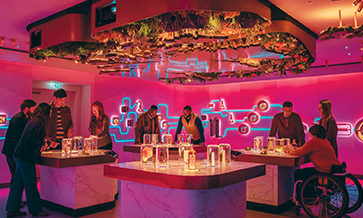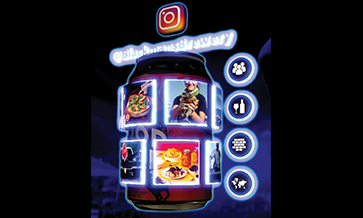Gaba (gamma amino-butyric acid) is a brain neurotransmitter that regulates our behaviour, mood and emotions, and is known to produce a calming effect. Science is making leaps in understanding how it works, how it interacts with other neurotransmitters, and how it can help us stay healthy and well.
These scientific advances are coinciding with people becoming much more concerned about the health impacts of their consumption choices. They’re demanding more choices, and Gaba Labs in the UK is responding to these demands by making alternatives to alcohol a reality.
The human brain contains an estimated 86 billion neurons. Those billions of brain cells communicate by passing chemical messages at the synapse, the small gap between cells, in a process called neurotransmission. Those chemical messages are unique molecules called neurotransmitters.
These are chemical messengers that transmit a message from a nerve cell across the synapse to a target cell. The target can be another nerve cell, a muscle cell, or a gland cell. They are chemicals made by the nerve cell specifically to transmit the message.
A neurotransmitter influences a neuron in one of three ways: excitatory, inhibitory or modulatory.
These billions of neurotransmitter molecules work constantly to keep our brains functioning, managing everything from our breathing to our heartbeat to our learning and concentration levels. They can also affect a variety of psychological functions such as fear, mood, pleasure and joy.
There are more than 40 neurotransmitters in the human nervous system; some of the most important are acetylcholine, norepinephrine, dopamine, Gaba, glutamate, serotonin and histamine.
Is it booze?
It is important to know that there are different types of alcohol: ethanol for drinking (grain alcohol), methanol as an industrial solvent (wood alcohol) and isopropanol as a disinfectant (rubbing alcohol).
Is Gaba like ethanol? Here’s how ethanol affects humans. At low doses (1-2 units or 15-10 gm of ethanol, or one to two drinks) a blood ethanol level of 40-100 mg% is produced. At this blood concentration, ethanol helps reduce anxiety primarily by activating Gaba to reduce brain excitability.
This explains why ethanol is so popular at parties where many of us use it to overcome the natural social anxiety about talking to strangers. This effect has been long understood by airlines, who quickly offer ethanol on a flight to calm the anxiety of air passengers who dislike flying.
But at higher concentrations (blood ethanol >150 mg%) ethanol begins to act as an antagonist at the NMDA receptor, leading to memory block (“blackouts”) and impaired judgement.
At higher levels (blood ethanol >400 mg%) the two effects of ethanol – the increase in Gaba inhibition and the blockade of glutamate excitation – can combine to produce a lethal level of sedation and respiratory depression. In terms of health impacts, ethanol is in a class of its own, and very different from Gaba.
The brain is performing a constant balancing act, trying to maintain equilibrium across all the neuro-transmitters. Too much Gaba can lead to hypersomnia or daytime sleepiness. At extreme levels, it can bring about a coma.
Synthetic ‘masala’
Gaba Labs is developing ingredients that aim to enhance Gaba activity in the brain and nervous system, thereby increasing sociability and conviviality while reducing anxiety.
Gaba Labs will bring the Alcarelle series of synthetic ingredients (including “alcosynth”) and its active botanical ingredient, known as ‘ABI’, to market and license this technology to the drinks industry.
The company aims to create new ranges of drinks that give some of the social and conviviality benefits of alcohol while reducing the risks of harm.
Ethanol, also known as ‘grain alcohol’, is the alcohol that people consume because they like some of the impacts it has on their mental and emotional states. However, ethanol causes significant damage to human tissue, particularly the brain and nervous system, heart, liver and pancreas.
As awareness of these harms increases, many consumers are turning away from ethanol as their beverage of choice for social gatherings. In fact, in 2015, the Japanese government introduced a new food classification, ‘Food with Functional Claims’.
This scheme involved reduced (though still stringent) certification requirements. This unleashed a food innovation revolution in Japan, and Gaba featured heavily in it.
In fewer than 4 years, Gaba became a well-established food additive in Japan, and everyone there has heard of it. You can find Gaba chocolate, Gaba drinks, Gaba cakes. Their functional claims centre on relaxation, dealing with stress and improving sleep.
People’s choice
We see a similar demand within the younger generations in Western cultures. These groups are not only demanding more information about their consumption choices, they’re actually also demanding more choices.
The man behind it all is psychiatrist and neuro-psycho-pharmacologist, Prof. David Nutt. A winner of several awards and recognitions, and a successful author and speaker, he headed Clinical Science in the National Institute of Alcohol Abuse and Alcoholism at the National Institute of Health in the US.
David set up the psycho-pharmacology unit at Bristol University; was Edmond Safra chair at Imperial College, London, and has edited the Journal of Psycho-pharmacology for 20 years.
“You can produce a whole range of effects like alcohol by manipulating this system in the brain. In some experiments, the effect is indistinguishable from alcohol,” he says. “We want to keep the pleasure, but not the pain, essentially. You don’t get the physiological changes that ethanol does from Alcarelle, I’ve tried and tested it myself.”
The social drinks company launched its first commercial botanical spirit named Sentia in January 2021. Sentia is currently available in the UK by pre-order exclusively on their direct-to-consumer site. With complex botanicals and a rich sensory experience discerning drinkers can discover a “third way” beyond ‘alcohol’ and ‘not alcohol’, with no chance of a hangover!
“I’m not suggesting we do away with alcohol, or that Alcarelle is a replacement. It’s about giving people a choice other than abstinence and alcohol,” he adds. For more information, visit https://gabalabs.com/.














